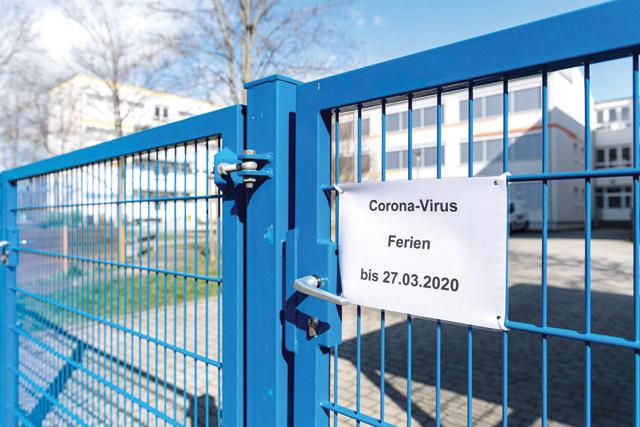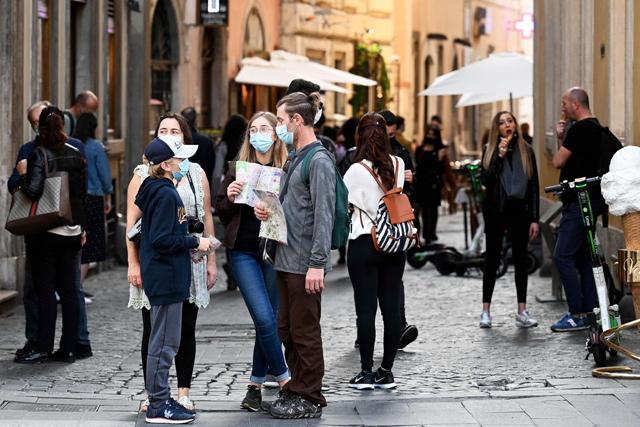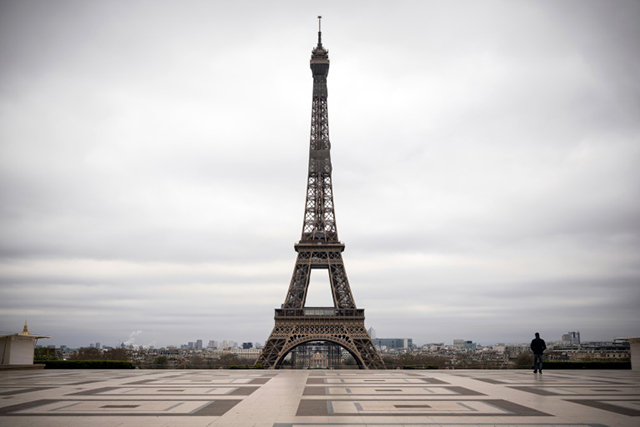You are here
Europe on lockdown as new virus epicentre
By AFP - Mar 14,2020 - Last updated at Mar 14,2020

This photo taken on Friday shows a sign reading 'Holidays until 27, 03, 2020' on an entrance door to a school in Halle/Saale, eastern Germany, after it was closed to limit the spread of the novel coronavirus (AFP photo)
GENEVA — The World Health Organisation declared Europe the new epicentre of the coronavirus on Friday as countries across the globe sealed borders, shut shops and schools and cancelled top cultural and sporting events in a frenzied bid to slow the ballooning pandemic.
Financial markets went on a rollercoaster ride after a week of spectacular losses triggered by fears the deadly outbreak will lead to a worldwide economic recession.
Infections and deaths soared in Europe on Friday, and WHO chief Tedros Adhanom Ghebreyesus said the continent now had "more reported cases and deaths than the rest of the world combined, apart from China".
He described it as a "tragic milestone", and warned that it was impossible to say when the virus would peak globally.
The overall death toll jumped to more than 5,000 across the planet, including nearly 1,500 in Europe, with total infections topping 140,000 across the planet, according to an AFP tally based on official sources.
Italy, Spain as well as Iran — which have emerged as virus hotspots — all clocked a dramatic rise in cases and fatalities in the past 24 hours, while infections were reported in Kenya and Ethiopia, the first in east Africa.
Governments have been pushing through tough new restrictions to contain the spread of the disease and unveiling big-bang emergency funding plans to try to limit the economic damage.
Leaders of the G-7, the world’s richest economies, will hold an extraordinary summit via videoconference on Monday to discuss the crisis.
The virus has torn up the sporting and cultural calendar, with top-flight events from Broadway to English Premier League football scrapped.
The outbreak reached new heights with a slew of public figures from Hollywood actors to politicians and even the Canadian first lady falling ill with the infection.
‘Worst in a century’
COVID-19, which first emerged in China in December, has spread relentlessly around the world even as cases in Asia have levelled out in recent days.
South Korea — once grappling with the largest outbreak outside China — saw newly recovered patients exceed fresh infections for the first time and the lowest number of new cases for three weeks.
And China this week claimed “the peak” of the pandemic had passed its shores although it still has the biggest overall number of deaths and infections.
Italy, the hardest-hit country in Europe, recorded its highest one-day toll with 250 deaths over the past 24 hours, while Spain declared a state of alert after its infections raced past 3,000.
A raft of European countries shut their borders to foreigners, closed non-essential businesses, restaurants and hotels and museums, and banned public gatherings.
France — the world’s most visited country — also closed the Eiffel Tower and the Louvre over what President Emmanuel Macron called “the worst health crisis in France in a century”.
The new measures came after US President Donald Trump this week banned all travellers from mainland Europe for 30 days, prompting a swift rebuke from Brussels which is now scrambling to shore up the EU economy.
In the United States, where schools are closing across the country and an increasing number of Americans are staying home, Louisiana became the first state to postpone its Democratic presidential primary and US airlines announced further steps to ground planes.
On the markets, Asian stocks tumbled in volatile business following the worst day on Wall Street since the crash of 1987 as traders scrambled to sell, wiping trillions off market valuations.
European and US stocks initially recovered on what analysts said were hopes of a US stimulus package but the rebound later fizzled out.
‘Panic has set in’
The virus is weighing heavily on daily life. Shops, squares and cafes normally packed with people are deserted in Italy, which has imposed nationwide lockdown measures never-before-seen in peacetime.
Spain’s once-bustling bars are also empty after the government urged people to stay home.
“The panic has set in and it’s going to get worse,” said Victor Rodrieguez, a 43-year-old engineer over a glass of vermouth at a Madrid tapas bar.
“I sent my friend a messaging saying: Let’s have a drink before they ban us! We walked here without taking public transport,” he told AFP.
And the illness is sparing no-one. Canadian Prime Minister Justin Trudeau announced he was in self-imposed quarantine after his wife tested positive, the day after Hollywood star Tom Hanks said he and his wife were infected.
Brazil’s President Jair Bolsonaro said on Friday he had tested negative after a top aide was confirmed infected.
Australia’s Home Minister Peter Dutton announced he had tested positive, while the Philippines leader awaits test results.
The virus has cut a swathe through sporting events around the planet and put a major question mark over the Tokyo Olympics, with Trump saying “maybe they postpone it for a year”, sparking furious denials from officials in the Japanese capital.
In Britain — where the government’s softly-softly strategy has raised some eyebrows — Queen Elizabeth II has put off engagements, and local elections planned for May have been cancelled.
With national authorities warning large gatherings should be avoided, entertainment venues like Disneyland have been closed and the curtain this week came down on Broadway.
Related Articles
ROME — Italy unveiled tough new restrictions on Sunday to help curb surging coronavirus cases, while the pandemic has taken centre sta
BEIJING — The number of cases from the new coronavirus topped 100,000 worldwide as official data Saturday showed a significant hit to Chines
PARIS — Almost 1 billion people were confined to their homes worldwide on Saturday as the global coronavirus death toll topped 12,000 and US



















